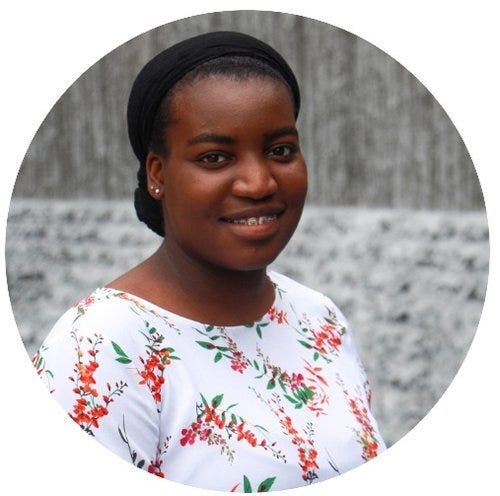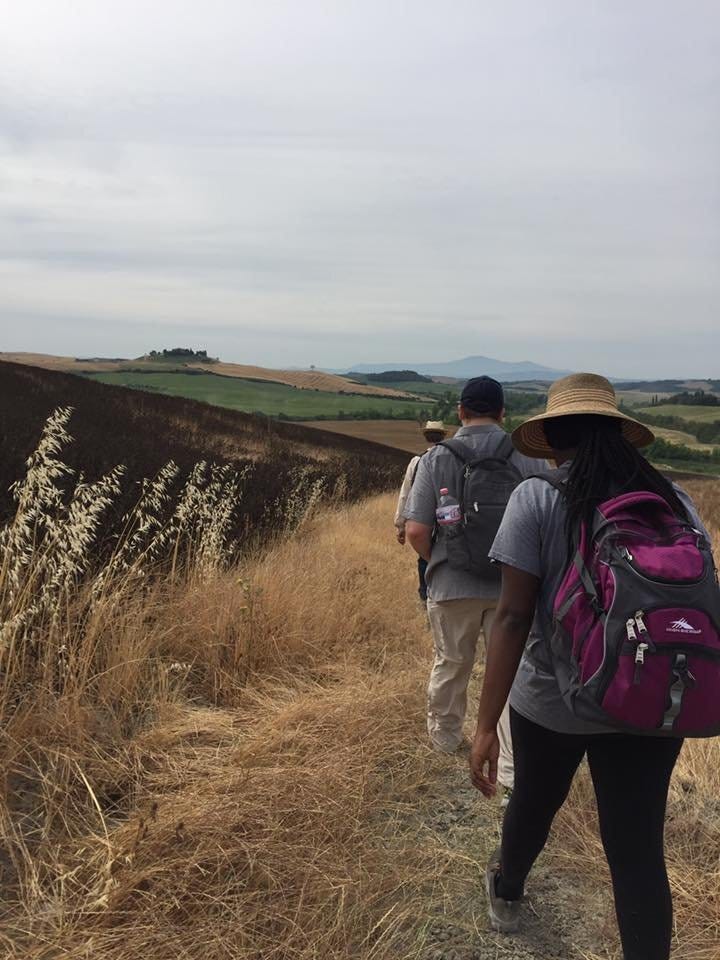Policy Director Bridges Policy Research and Human-Centered Design
Blaire dives into design justice and how Paragon has positively impacted her personal and professional development.
Contributed by Kaitlyn Cui
This interview has been lightly edited for length and clarity.
Please introduce yourself to our readers!
My name is Blaire Bosley. I am currently a fifth-year PhD candidate at the Georgia Institute of Technology and current Policy Director at Paragon. Academically, I have an undergraduate and master’s degree in history. My current PhD, though, is in digital media: specifically because as a historian, I was doing a lot of work within digital history. I thought a lot about how people learn and talk about history, and the ways that history is preserved or archived. So now, a lot of the work I do in my PhD is thinking about technology at this intersection, but also understanding how people utilize technology and the ways that communities can advocate for themselves with the tools that are available to them.
Outside of academia, I previously thought I wanted to work in a museum and so I some experience working in a design museum. While working in the Design Museum I also really got interested in user research, so I got the opportunity to work in the local government, specifically with the Massachusetts Bay Transit Authority (MBTA). I was helping the MBTA understand how they were engaging with the users, and creating a research methodology that they could utilize to ensure that the research they're doing and conducting with MBTA riders is reflective of the greater Boston community. Previously, the research they were engaging with was only with people they could recruit, which was not reflective of the greater Boston community or their riders. I was able to visit Boston and do some outreach work with them, which pivoted me towards doing more community engagement work, working with governments to create free, accessible tools and technologies that are responsible and human-centered.
How did you first learn about Paragon and what prompted you to apply?
I learned about Paragon through the Design Justice Network, which is a group of designers and individuals around the world who practice ta methodology called design justice. It's the idea that design should have an impact on people, and at the same time, people should have input and impact on the technology that they’re utilizing. For example, a lot of universities and researchers are creating really cool tools meant to help folks who have visual impairment. There was recently a university that came out with a robot dog that would allow people who have vision impairments to use the robotic dog to help them navigate. While there was great feedback from the tech community, some people with visual impairments did not want it. They pointed out, we're gonna have to charge it. We're gonna have to lug it around if the battery dies. We're gonna have to know when the battery dies. We're gonna need access to public outlets. What came out of this was them calling out the fact that, they don't need new technology for something like guide dogs that already exist. The real problem is that the process to get a guide dog can take up to a year; in addition to many other challenges. All this is to say design justice is not about building solutions when people in the community that you're designing for are already developing these solutions themselves. Back to Paragon, so when the Design Justice Network posted the recruitment announcement, I thought this sounded like a great opportunity and I had nothing to lose. So I applied, and that’s how I came in as a Project Lead.
What was your project at Paragon, and favorite part about your project?
I was the first spring and summer cohort that worked for the State of Georgia creating Generative AI standards for their 400,000 plus employees. One of my favorite parts of Paragon is the fact that you get to work with such a diverse group of peers with a wealth of experience in different policy areas and sectors. But also, we were able to have very in-depth conversations about the work we were doing for Georgia. Combining these two aspects, we had people connecting their diverse interests to policymaking in a forward-thinking way. This might have been problematic for other people, but Georgia didn't give us a structured scope of work. Because of the open nature of our deliverable, we ended up creating policy incorporating so many unique ways of thinking.
I saw the final presentation for the Georgia fall cohort, and the fellows have continued to approach their project in really unique ways. For instance, the team brought up thinking about what actually is biased data, and the idea that you can't fully work with a large language model (LLM) that is not going to be biased. So people need to think of bias thresholds. It’s been a great opportunity to work with an amazing group of scholars. Our government partner, Nikhil Deshpande also allowed us to have conversations in a very open manner was amazing.
Tell us more about your background and how it has connected to your work at Paragon.
I like that work with Paragon for Georgia has always been human-centered. The Georgia Technology Authority (GTA) is not an enforcement agency. People can observe what they're saying, they can read what they're saying, but that doesn't mean they have to listen to them. And so because of this, I think there has always been a more humanistic way of approaching standards, and trusting that people will understand what we're saying and trust that they’re willing to listen to us. Even when I was with the MBTA, one of the things we often said was moving at the “Speed of Trust,” because pushing forward policies is all about listening to the people that you're servicing while trying to ensure that their voices and opinions are implemented within that work. That's how I viewed our project: thinking about the people that this policy will be servicing and that the GTA is servicing, and then ways that we can approach their use of technology without fear-mongering. Ensuring that we are approaching AI usage through a lens of exploration and curiosity combined with data security and privacy.
How has Paragon impacted your professional and personal development?
*This interview was conducted in December 2024: the information provided was accurate at the time of recording.
Paragon helped me identify skills I need to work on, especially in leadership. I would also say that Paragon was one of the key touchstones that allowed me to get the job I have. For more detail, I'm a student trainee within what’s like the IT department for the Department of Labor specifically working in governance. During my interview, I was able to point to Paragon when they asked me questions like: How do I explain things? How do I work with groups? Why am I interested in working with the government? I was able to point to Paragon and the work that I've been able to do, specifically with local governments, assisting with team development, assisting with the organizational structure of the team, connecting with government partners, and writing policy. That really helped me get to the position I have right now and also has helped create a lot of different opportunities that I probably wouldn't have gotten if I didn't have this experience.
For example, because I mentioned I was interested in AI policy, I was able to co-lead an AI initiative within my department. In these conversations and workshops, I have been able to speak through topics such as prompt writing, output validation, and building confidence in responsible usage of the technology. I have been able to lead these sessions because of the background I have from Paragon, like, I know about AI policy because I have the experience to co-write guidance for Georgia’s standards, so I'm able to explain key information and have people understand. From Paragon I also gained the ability to be able to utilize more specialized terminology within the Gen AI field, but also re-interpret the information for those who are not as familiar with these topics.
Paragon has given me opportunities that I don't think I would have had if I had gone into my current role with my normal resume. I was talking to someone recently who was on the hiring team, and mentioned that people were super impressed with my resume and that I had the most internal teams asking for me to work with them. I believe this is due to the experience and skills I acquired as a Paragon Fellow.
Paragon Fun Fact (PFF): Blaire loves exploring new places and is an avid solo traveler! Last year she was accepted to a conference in Japan, and is constantly open to discovering new destinations. When she’s not traveling, Blaire volunteers as a mentor for FIRST Robotics competitions: something she participated in during high school that sparked my ongoing interest in engineering, and teaches an architecture class, where she shares her appreciation for design with others!





